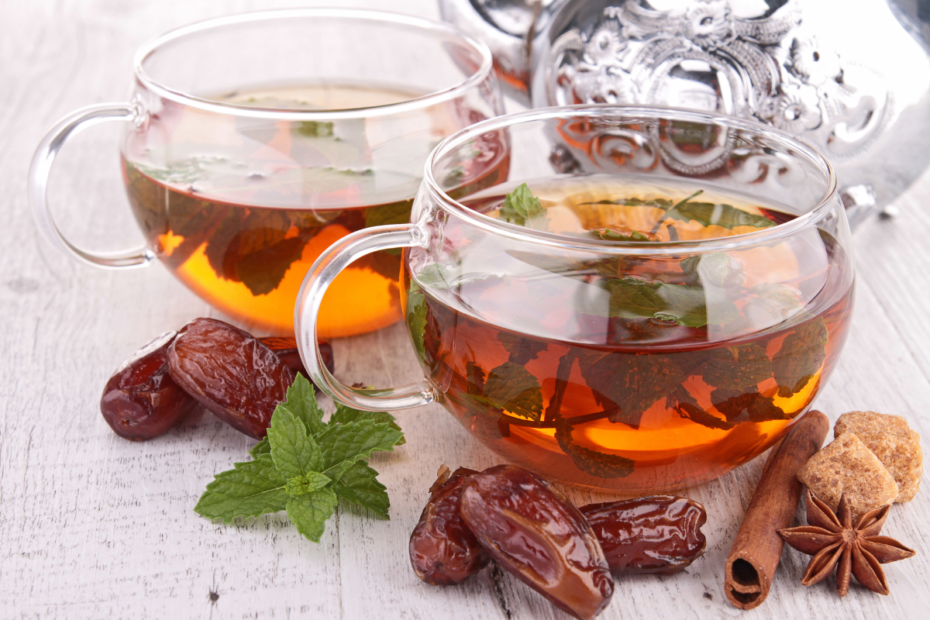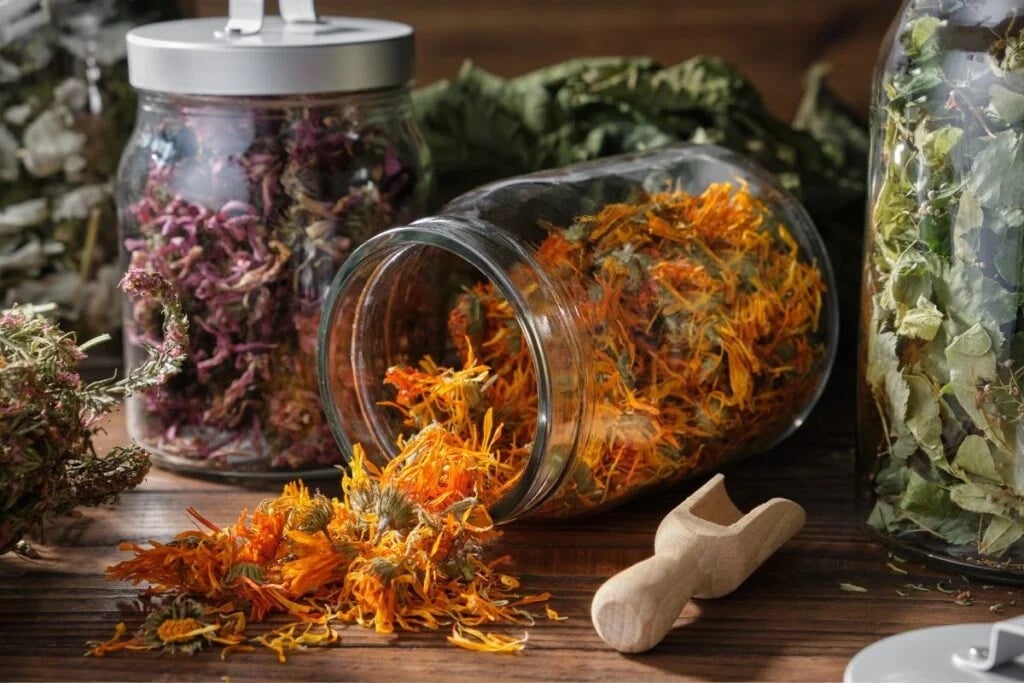People make date tea from dates—also known as phoenix fruits—that grow on the date palm (Phoenix dactylifera). While many tropical regions traditionally cultivate these palms, you can also grow them at home under the right conditions. Dates come in a range of colors, from yellow to deep black, and have exceptional nutritional value. Rich in essential nutrients, dates have long been a staple food. Their history stretches back thousands of years, with evidence of cultivation as early as 5000 BCE. Though their exact origin remains uncertain.
The size and weight of dates vary widely depending on the variety, ranging from 18 to 110 mm in length, 8 to 32 mm in width, and 2 to 60 g in weight. Each fruit contains a single seed. There are countless cultivars worldwide, producing both dry and juicy fruits in different sizes. Dried dates contain up to 75% natural sugars (sucrose, fructose, and glucose), around 9% protein, and 2% fat, along with vitamins E, A, and B-complex.
Dates have gained popularity across Western countries and are most commonly sold in dried form in recent years. Whether fresh or dried, they retain their nutritional richness. A simple way to tell them apart is by their skin: wrinkled skin indicates dried dates, while smooth skin signals freshness.
In many northern countries, making date tea is not a common tradition. However, date tea and other date-based beverages are popular in cultivation regions for their rich flavor and health benefits. Trying these recipes is an excellent way to enjoy the exotic taste of dates in a warming drink and feel a unique and exotic experience.
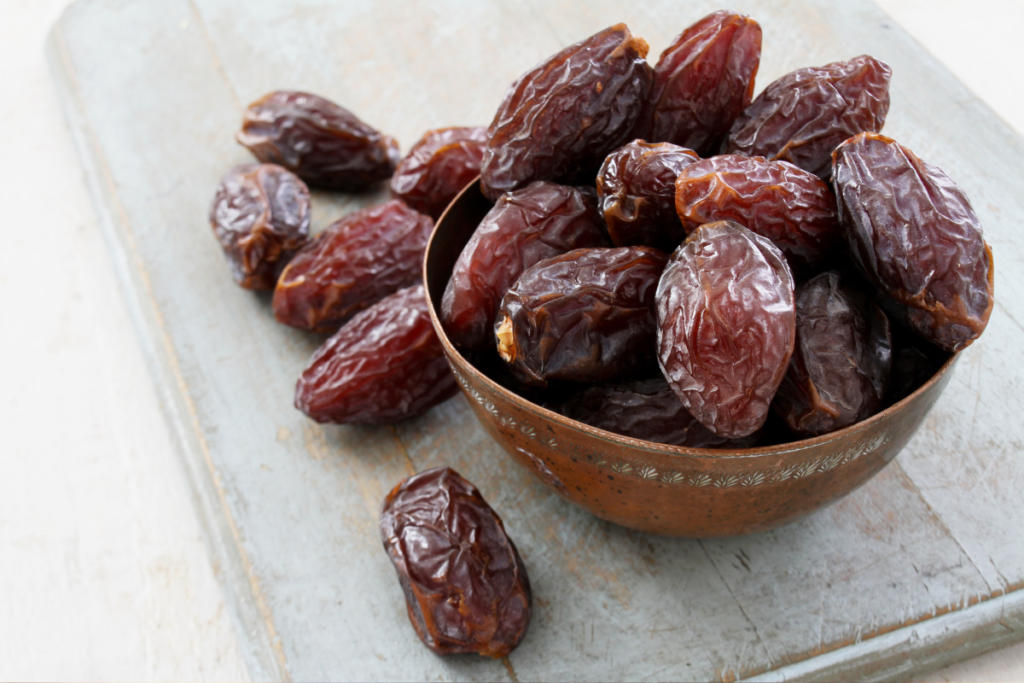
Health Benefits of Dates
Dates are loaded with antioxidants and dietary fiber. Their nutrient density makes them easy to incorporate into daily meals, offering both versatility and numerous health benefits. For those with stable blood sugar levels, experts generally recommend enjoying 3–5 dates per day. Excessive consumption, however, may cause unwanted side effects.
Dates are incredibly versatile, and you can enjoy them in countless ways. They are delicious on their own but also serve as a natural binder and sweetener in baking. Combined with seeds and nuts, they make excellent energy bars or healthy confections. You can blend dates into smoothies, stir them into oatmeal, or use them in sauces and marinades for a natural touch of sweetness. They are rich in fructose, a natural sugar, making them a healthy alternative to refined white sugar in recipes. However, moderation is essential due to their calorie content.
Dates are rich in carbohydrates, minerals, vitamins, and fiber. Dried dates are more calorie-dense than fresh ones, with a caloric profile similar to figs or raisins. For example, 100 g of Medjool dates provides approximately 40% of the daily copper requirement, 15% of potassium and vitamin B6, 13% of magnesium and manganese, and 5% of iron.

Key Health Benefits of Dates and Date Tea
The high fiber content of dates promotes regular bowel movements, helping to prevent constipation. Amino acids, nicotine, and fibers in dates help cleanse the intestines of harmful bacteria while supporting the growth of beneficial gut flora. Fiber also helps regulate blood sugar by slowing digestion, giving dates a low glycemic index.
Thanks to their low glycemic index, people managing diabetes can consume dates in moderation.
The soluble fiber in dates binds to cholesterol, preventing it from being absorbed into the bloodstream. This helps reduce “bad” LDL cholesterol levels, lowering the risk of atherosclerosis and heart disease.
Dates contain higher antioxidant levels than dried figs or prunes. Flavonoids help reduce inflammation and may lower the risk of diabetes, Alzheimer’s disease, and certain cancers. Carotenoids support heart and eye health, while phenolic acids suggest anti-inflammatory benefits and protection against cardiovascular disease and oncological issues.
Preliminary studies show that antioxidants in dates may improve memory, learning, cognitive function, and brain health.
Eating dates during the last weeks of pregnancy may help soften the cervix and reduce the need for labor induction, potentially shortening labor time. The compounds interact with oxytocin receptors, mimicking the effects of oxytocin (the hormone that triggers contractions). Dates also contain tannins, which may aid uterine contractions.
Dates’ high potassium levels regulate heart rate, breathing, and muscle function, while also helping to control blood pressure by balancing sodium levels. While essential minerals contribute to strong bones and may reduce the risk of osteoporosis.
Regular consumption of dates can support red blood cell production, reducing the risk of anemia, fatigue, and weakness due to iron content.
Eating 3–4 dates daily may improve brittle hair and split ends, as well as reduce hair loss. Vitamin B5, abundant in dates, plays a vital role in hair nourishment.
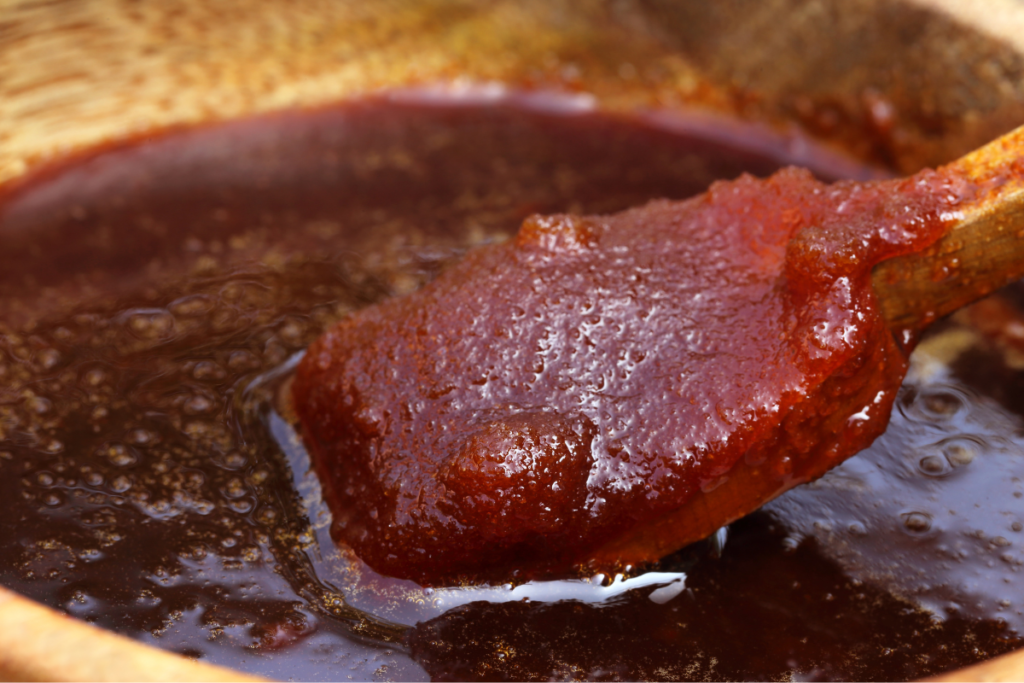
Date Paste—A Natural Substitute for White Sugar
If you’re looking for a healthier alternative to refined white sugar, homemade date paste is a perfect choice. Blend equal parts of fresh dates and water in a food processor until smooth.
If you prefer to make the paste using dried dates, here’s what you’ll need:
- 1 liter (4 cups) of water
- 340 g (4 cups) of pitted dried dates – Medjool dates work best
Instructions:
- Bring the water to a boil in a saucepan. Add the pitted dates.
- Transfer the dates to a bowl, pour in the hot water, and then let them soak for about 10 minutes to soften.
- Drain the water into a separate container—you’ll need some of it to adjust the paste consistency later.
- Place the softened dates into a blender with about 1 cup of the soaking water. Blend until smooth and creamy. If the mixture is too thick, add a splash more soaking water.
- Transfer the paste to a clean jar and store it in the refrigerator. Properly sealed, it will keep for up to 3 months.
How to use date paste in recipes: Whenever a recipe calls for 1 cup of sugar, you can replace it with 1 cup of date paste. This natural sweetener not only provides sweetness but also adds extra nutrients and fiber to your dishes.
Green Tea with Dates
This refreshing blend combines the energizing qualities of green tea with the natural sweetness and nourishing properties of dates. It’s a soothing yet stimulating beverage, perfect for any time of the day.
Ingredients (for 1 cup):
- 2 g of green tea (feel free to experiment with flavored blends such as fruity, anise, or ginger teas, depending on your taste or what you have at home)
- 4 dates
- 200–250 ml of water
Instructions:
- Rinse the dates in cold water, slice them open, and remove the pits.
- Place the dates and tea leaves into a tea infuser.
- Pour over hot water at about 85°C (185°F) and let steep for at least 3 minutes.
- Remove the infuser with the tea leaves and dates, then enjoy your fragrant and naturally sweetened date tea.

Chinese Ginger and Date Tea
In Chinese tradition, ginger tea is considered one of the most reliable remedies for colds, a recipe that has been passed down per generation. It is believed to boost circulation, warm the body, and speed up recovery. This tea harnesses the healing properties of ginger while combining them with the nutritional benefits of dates.
It’s important to note that Chinese ginger tea is not an everyday beverage— experts recommend consuming it medicinally. One or two cups a day are more than enough.
A tip: keep fresh ginger sliced and stored in the freezer so you can easily prepare ginger tea at the first signs of a cold.
How to prepare Chinese ginger tea with dates:
- Place chopped or grated ginger root and pitted dates into a small saucepan. Add water.
- Cover the pot and bring it to a boil.
- Once boiling, reduce the heat and let it simmer gently for 15–20 minutes.
- Strain the tea through a fine sieve before serving.
- Sweeten with brown sugar or honey if desired.
- For maximum healing effect, drink the hot date tea.
Korean-Style Date Tea
In Korea, tea is often made with jujube dates, but you can easily adapt the recipe using the dates available in most supermarkets or specialty food stores. This tea has a subtle apple cider flavor, and you can enjoy it either hot or chilled.
Ingredients:
- 3 handfuls of dates (about 15–20 pieces)
- 1 piece of fresh ginger, cut into chunks (the larger the piece, the stronger the flavor)
- 3 cinnamon sticks
Instructions:
- Fill a large pot (volume of 2–2.5 liters) almost to the top with water and boil it.
- Add the dates, ginger, and cinnamon sticks. Reduce the heat and simmer gently for about 3 hours.
- Strain the tea to remove any solids.
- Drink immediately while warm, or store in the refrigerator for up to 2 weeks.
- Sweeten the date tea with honey or your preferred natural sweetener before serving.
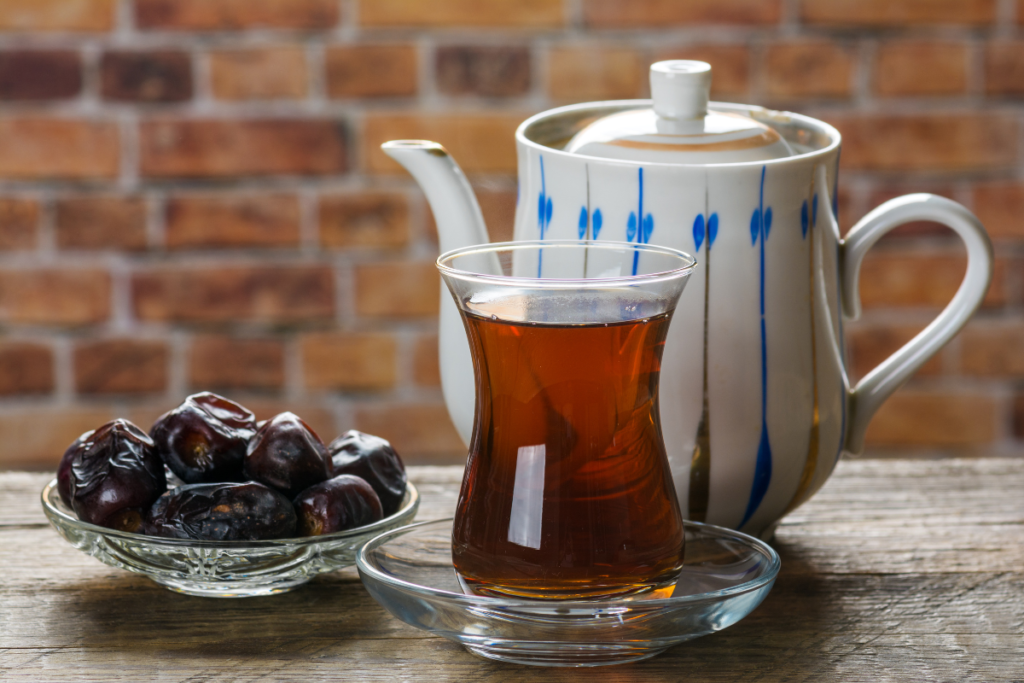
Date Tea and Possible Side Effects
While dates have become increasingly popular in Lithuania and are enjoyed more frequently, many people are unaware that overconsumption can cause side effects. In moderate amounts, dates are safe and nourishing; too many may lead to health issues.
For people with normal blood sugar levels, 3–5 dates per day is generally safe. The best time to enjoy them is in the morning or with breakfast, as they provide lasting energy throughout the day.
Potential Side Effects of Excessive Date Consumption
- Digestive discomfort. If you are not used to a high-fiber diet, eating too many dates at once may cause constipation or bloating. It happens because fiber absorbs water, making it difficult to pass.
- Asthma-related reactions. Dates can sometimes trigger allergies, which may also lead to asthma attacks. 70–80% of people with asthma are sensitive to airborne allergens (mold) on dried fruits, including dates.
- Skin rashes. Sulfites, commonly added to dried fruits to prevent bacterial growth or naturally occurring mold, can cause skin irritation in sensitive persons.
- Weight gain. Dates are highly nutritious but also calorie-dense, so overeating may contribute to excess weight.
- Tooth decay. Although dates contain fluoride, which helps protect teeth, their high sugar and carbohydrate content can still lead to cavities if oral hygiene is neglected. Always brush your teeth after eating dates to preserve dental health.
- Diabetes risks. Due to their natural sugar content and high calorie load, overconsumption of dates is not recommended for people with diabetes.
- Wax coatings. Some suppliers coat dates with wax to give them a shiny, appealing look. These coatings may contain harmful substances that upset the stomach.
- Dates are naturally rich in potassium. People with elevated potassium levels in their blood should avoid excessive intake, as this can lead to hyperkalemia.
- Not suitable for infants. Babies should not be given dates, as their developing digestive systems cannot process the high fiber content.
Sources:
- https://www.healthline.com/nutrition/benefits-of-dates
- https://seventeahouse.com/blogs/tea-gifts/red-dates-tea-benefits-a-nutritional-powerhouse-for-your-health
- https://www.health.com/nutrition/groceries/health-benefits-dates
Associative photos © Canva.
